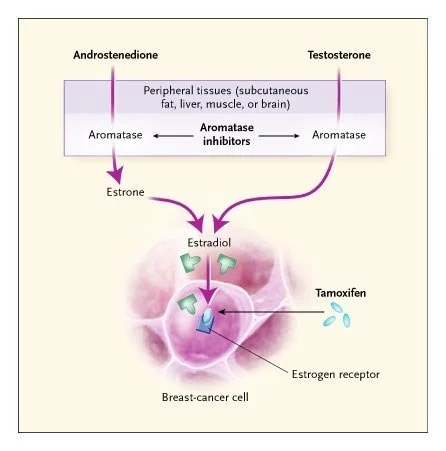Anastrazole for breast cancer prevention
Breast cancer is a common cancer in women with 1 in 7 women developing it at some point in their life. It is most common in women over the age of 50 and increasing age is the biggest risk factor for developing breast cancer. About 23% of breast cancers are preventable by lifestyle measures:
8% obesity (fat tissue produces oestrogens)
8% alcohol
5% not breastfeeding
2% HRT use
<1% oral contraceptive use
80% of breast cancers are oestrogen receptor positive which means that oestrogen attaches to the outside of the cancerous cell and stimulates it to grow. It is thought that the more oestrogen you are exposed to throughout your life, the greater your risk of developing breast cancer. Anastrozole works by inhibiting the enzyme aromatase, thereby reducing the amount of oestrogen (estradiol) produced, and therefore halves the risk of developing breast cancer.
It is taken once daily for 5 years in postmenopausal women, and can’t be taken with HRT. The data so far shows that it reduces the risk of developing breast cancer for the 5 years whilst taking the medication and for at least 7 years afterwards (12 years in total).
The reduction in oestrogen levels throughout the body does cause side effects which include hot flushes, feeling weak, pain or stiffness in the joints, arthritis, skin rash, nausea, headache, osteoporosis, and depression - essentially the same symptoms as the menopause.
In the UK it is estimated that about 289 000 women are eligible for this treatment. If you are not at increased risk of breast cancer then it is not recommended that you take it as the benefit is so small, however if you are at moderate or high risk then this is an option for you to consider. Your risk is calculated using a number of different risk factors via the CanRisk tool:
Family and personal-proband history of breast, ovarian, prostate and pancreatic cancer
Rare pathogenic variants in moderate and high risk susceptibility genes
Age information on unaffected family members
Ashkenazi Jewish origin
Information on year of birth to capture birth cohort
Age of menarche
Parity
Age at first live birth
Use of oral contraception
Use of menopause hormone therapy
Body mass index
Daily alcohol intake
Mammographic density
Height
Common cancer genetic susceptibility variants
(Polygenic Risk Scores)
At Sirona Health we can calculate your individual risk and refer you to a specialist if would like to consider preventative medication. We can also help to reduce the other risk factors for breast cancer through lifestyle modification, and appropriate medications for contraception and menopause management depending on your personal risk.

